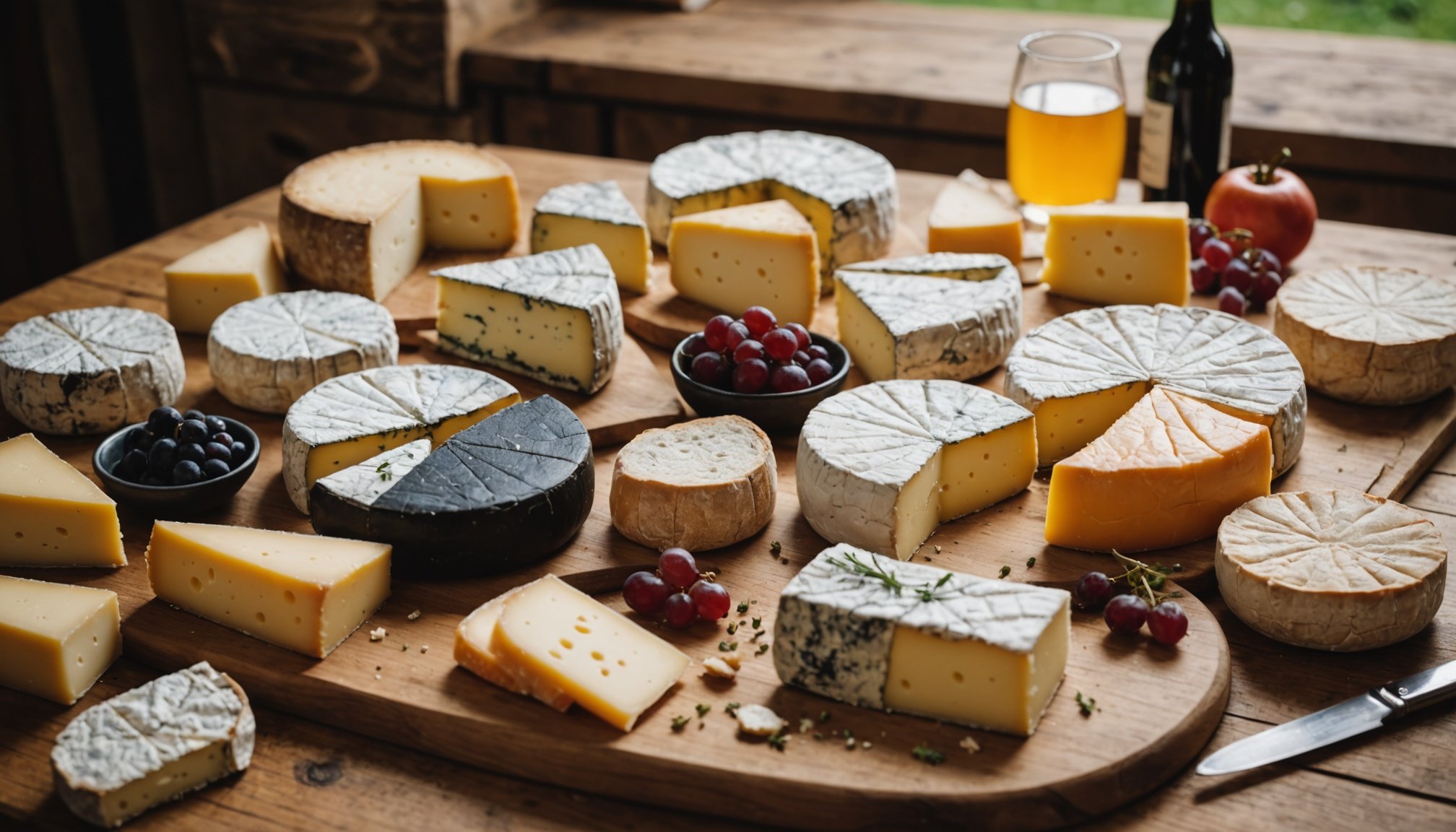Understanding the Digital Marketing Landscape for Artisan Cheese Makers
In the increasingly competitive UK cheese market, especially for niche products like artisan cheese, it’s crucial for producers to leverage effective digital marketing strategies. Artisan cheese makers need to increase their visibility and reach an audience that appreciates their unique offerings.
An in-depth understanding of UK cheese market trends indicates a growing consumer preference for quality, locally sourced products. This shift presents an opportunity for artisan cheese makers to reinforce their digital presence by connecting with consumers seeking authentic experiences.
In the same genre : Unlocking global potential: key strategies for uk e-commerce companies to maximize success in cross-border transactions
Digital marketing for artisan cheese demands a tailored approach. Social media platforms, like Instagram and Facebook, are pivotal channels for showcasing the craftsmanship and stories behind the cheeses. High-quality imagery and engaging narratives can significantly enhance brand recognition. Additionally, investing in a well-structured website with eCommerce capabilities ensures an avenue for direct sales and broader market reach.
Search Engine Optimization (SEO) is another essential element. By optimizing content to appear in relevant search queries, artisans can draw organic traffic to their sites. Email marketing also remains an effective tool to deepen customer relationships, offering updates, and exclusive deals. A strategic combination of these channels creates a robust online marketing strategy for artisan cheese makers.
Also read : Create subtitles with ai: enhance your videos instantly
SEO Strategies for Artisan Cheese Makers
Navigating the digital landscape can be challenging for any business, especially those in the artisanal cheese sector. SEO for food businesses is crucial for enhancing online visibility. By focusing on keyword optimization, cheese makers can ensure that potential customers find them when searching for related products.
Conducting thorough keyword research is the first step. Identifying search terms that resonate with your target audience is vital. Utilize tools that reveal what customers are typing into search engines. This insight allows you to craft content that answers their questions and draws them in.
On-page SEO is another critical component. Carefully crafted product descriptions with strategic keyword placement improve discoverability. Meta tags should not be underestimated either, as they summarize the content of your pages to search engines.
Furthermore, for brick-and-mortar operations, local SEO techniques are indispensable. Optimizing geographic keywords and engaging with local directories ensures that customers nearby can discover your delightful artisanal offerings. Appearing in local search results substantially increases the likelihood of attracting foot traffic.
Incorporating these strategies can significantly enhance your online presence, helping you connect with cheese enthusiasts and boost sales.
Content Marketing Approaches
Creating a compelling narrative around artisan cheese not only taps into the sensory appeal of food but also the rich cultural heritage of its origins. By weaving storytelling in food marketing, brands can connect deeply with consumers. A well-told story might involve a century-old recipe or the specific region that produces a distinct flavour. This approach enhances authenticity and builds emotional engagement with the product.
In crafting engaging blog content strategies, it is crucial to educate and inform. The content should not merely advertise but offer insights, such as pairing suggestions or nutritional information. Content that aids consumers in understanding the nuances of artisan cheese enriches their appreciation and decision-making process.
Visuals are potent tools in content marketing for cheese. High-quality images or videos showcasing the texture, colour, and presentation of the cheese can captivate the audience. Visual storytelling can convey the artisanal process and craftsmanship involved in production, making it a vital component of the marketing strategy.
In summary, a combination of compelling storytelling, educational blog content, and captivating visuals can create a robust content marketing plan that resonates with cheese enthusiasts and newcomers alike.
Harnessing Social Media for Visibility
In the digital age, social media for food brands is vital. Platforms like Instagram are particularly useful for marketing cheese, given their visual nature. But how do you pick the right platform? It’s crucial to consider where your audience is most active. Cheese enthusiasts might sway more towards Instagram and Pinterest for their aesthetic appeal.
Now, let’s delve into community engagement online. Building a community isn’t just about posting beautiful pictures of cheese. It’s about fostering genuine interaction. Engage with your audience by asking questions, hosting polls, or sharing user-generated content. This interaction not only cultivates a loyal following but also provides invaluable feedback for your products and marketing strategies.
Examining case studies in social media campaigns reveals diverse strategies. For example, one artisan cheese brand gained success by hosting live tastings on Instagram. This approach allowed real-time interaction, creating an immersive experience that resonated with their audience.
By leveraging Instagram marketing for cheese, brands can enhance visibility and create connections. Remember, the key is to remain consistent and authentic, ensuring your content reflects the quality and passion behind your products.
Email Marketing Techniques
In the realm of email marketing for artisan producers, building an effective email list is crucial. This involves best practices for collecting subscriber information, such as including a sign-up form on your website and offering incentives for joining your list. These practices not only help grow your list but also ensure that subscribers are genuinely interested in your offerings.
Customer relationship management is another key aspect. By segmenting your subscribers based on their interests and purchase history, you can tailor your messages to better match their preferences. This personalized approach fosters a stronger relationship and can boost engagement rates.
When it comes to crafting newsletters, strategies that drive customer engagement and sales should be a priority. This involves creating compelling content, using eye-catching layouts, and incorporating clear calls-to-action. Great newsletters never just sell; they offer value, such as industry insights or exclusive offers.
To optimize your efforts, analyzing campaign performance is essential. This means tracking metrics like open rates, click-through rates, and conversion rates. By understanding these metrics, you can refine your email marketing strategies continuously, ensuring they are effective and aligned with your business goals.
Collaborations and Partnerships
In the food industry, strategic alliances offer valuable advantages. One key benefit is the partnerships with local suppliers and artisan producers. By engaging in such collaborations, companies can not only enhance their reputation for supporting local communities but also ensure fresher ingredients and unique flavours in their offerings. This resonates with consumers seeking authenticity and sustainability.
Successful examples illustrate the power of co-branding strategies in digital marketing. Companies that align with like-minded brands can create impactful campaigns that leverage combined marketability. By pooling resources, both companies can enhance their visibility and reach broader audiences.
In practice, collaborations often translate into the creation of bundled products or joint events. Consider a food company joining forces with a beverage brand to offer a co-branded dinner package; consumers appreciate the convenience and novelty. Such strategies can amplify a brand’s marketing reach by tapping into the existing customer bases of the partners involved.
Engaging in food industry partnerships through digital platforms and events allows brands to position themselves as innovative and customer-focused. These collaborations are not merely trend-based but are strategic methods to enhance brand recognition, foster growth, and improve customer relation.
Measuring Success and Analytics
Understanding the success of a marketing campaign is crucial. One must focus on key performance indicators (KPIs) to evaluate effectiveness. KPIs such as conversion rates, customer acquisition cost, and engagement levels help monitor the performance measurement of campaigns.
Using marketing analytics, businesses track data to gauge the success of their efforts. Tools and software like Google Analytics and Hootsuite are invaluable in monitoring website traffic and social media engagement. These platforms offer insights into visitor behaviour, popular content, and peak engagement times, enabling informed decision-making. For artisans and small-scale businesses, such as those in the niche market of artisan cheese, it is essential to leverage these metrics.
Determining the ROI in digital marketing is another vital component. Businesses must assess whether the money spent on digital tactics results in measurable returns. This involves comparing the cost of marketing campaigns with the revenue they generate.
To refine marketing tactics, businesses should make data-driven decisions. Identifying trends and learning from them allows for the adaptive flexibility needed to stay competitive. Continually analyzing data and adjusting strategies is key to maximizing marketing ROI and bolstering the brand success story in the competitive marketplace.
Success Stories and Case Studies
Understanding the strategies employed by successful artisan cheese brands offers invaluable insights into digital marketing for niche food products. These case studies reveal creative approaches and what others can learn from them.
One compelling example is an artisan cheese company that harnessed social media for their marketing. They used storytelling to emphasize the uniqueness of their products, capturing customer interest and expanding their reach. This strategy highlights the importance of aligning brand values with customer engagement. By integrating detailed photography and engaging content, they effectively communicated their brand identity.
Testimonials in artisan cheese reveal practical aspects of their success. Industry leaders often stress the importance of authenticity in product representation and connecting with consumer values. These testimonials serve as a roadmap, inspiring others to pursue thoughtful consumer relationships.
Lessons from case studies typically emphasize best practices such as prioritizing transparency, leveraging customer feedback, and fostering community involvement. This not only strengthens brand loyalty but also catalyzes organic growth.
Essentially, by adopting these best practices from successful brands, niche food marketers can craft campaigns that resonate profoundly with their target audiences. Embracing these insights cultivates a brand presence that feels authentic and enduring.






